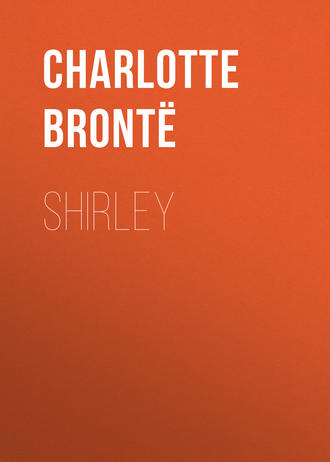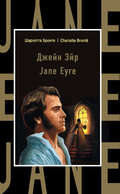
Шарлотта Бронте
Shirley
'Our God, our help in ages past,
Our hope for years to come,
Our shelter from the stormy blast,
Our refuge, haven, home!'"
Mrs. Pryor at once complied.
No wonder Caroline liked to hear her sing. Her voice, even in speaking, was sweet and silver clear; in song it was almost divine. Neither flute nor dulcimer has tones so pure. But the tone was secondary, compared to the expression which trembled through – a tender vibration from a feeling heart.
The servants in the kitchen, hearing the strain, stole to the stair-foot to listen. Even old Helstone, as he walked in the garden, pondering over the unaccountable and feeble nature of women, stood still amongst his borders to catch the mournful melody more distinctly. Why it reminded him of his forgotten dead wife, he could not tell; nor why it made him more concerned than he had hitherto been for Caroline's fading girlhood. He was glad to recollect that he had promised to pay Wynne, the magistrate, a visit that evening. Low spirits and gloomy thoughts were very much his aversion. When they attacked him he usually found means to make them march in double-quick time. The hymn followed him faintly as he crossed the fields. He hastened his customary sharp pace, that he might get beyond its reach.
"Thy word commands our flesh to dust, —
'Return, ye sons of men;'
All nations rose from earth at first,
And turn to earth again.
"A thousand ages in Thy sight
Are like an evening gone —
Short as the watch that ends the night
Before the rising sun.
"Time, like an ever-rolling stream,
Bears all its sons away;
They fly, forgotten, as a dream
Dies at the opening day.
"Like flowery fields, the nations stand,
Fresh in the morning light;
The flowers beneath the mower's hand
Lie withering ere 'tis night.
"Our God, our help in ages past,
Our hope for years to come,
Be Thou our guard while troubles last —
O Father, be our home!"
"Now sing a song – a Scottish song," suggested Caroline, when the hymn was over – "'Ye banks and braes o' bonnie Doon.'"
Again Mrs. Pryor obeyed, or essayed to obey. At the close of the first stanza she stopped. She could get no further. Her full heart flowed over.
"You are weeping at the pathos of the air. Come here, and I will comfort you," said Caroline, in a pitying accent. Mrs. Pryor came. She sat down on the edge of her patient's bed, and allowed the wasted arms to encircle her.
"You often soothe me; let me soothe you," murmured the young girl, kissing her cheek. "I hope," she added, "it is not for me you weep?"
No answer followed.
"Do you think I shall not get better? I do not feel very ill – only weak."
"But your mind, Caroline – your mind is crushed. Your heart is almost broken; you have been so neglected, so repulsed, left so desolate."
"I believe grief is, and always has been, my worst ailment. I sometimes think if an abundant gush of happiness came on me I could revive yet."
"Do you wish to live?"
"I have no object in life."
"You love me, Caroline?"
"Very much – very truly – inexpressibly sometimes. Just now I feel as if I could almost grow to your heart."
"I will return directly, dear," remarked Mrs. Pryor, as she laid Caroline down.
Quitting her, she glided to the door, softly turned the key in the lock, ascertained that it was fast, and came back. She bent over her. She threw back the curtain to admit the moonlight more freely. She gazed intently on her face.
"Then, if you love me," said she, speaking quickly, with an altered voice; "if you feel as if, to use your own words, you could 'grow to my heart,' it will be neither shock nor pain for you to know that that heart is the source whence yours was filled; that from my veins issued the tide which flows in yours; that you are mine– my daughter – my own child."
"Mrs. Pryor – "
"My own child!"
"That is – that means – you have adopted me?"
"It means that, if I have given you nothing else, I at least gave you life; that I bore you, nursed you; that I am your true mother. No other woman can claim the title; it is mine."
"But Mrs. James Helstone – but my father's wife, whom I do not remember ever to have seen, she is my mother?"
"She is your mother. James Helstone was my husband. I say you are mine. I have proved it. I thought perhaps you were all his, which would have been a cruel dispensation for me. I find it is not so. God permitted me to be the parent of my child's mind. It belongs to me; it is my property – my right. These features are James's own. He had a fine face when he was young, and not altered by error. Papa, my darling, gave you your blue eyes and soft brown hair; he gave you the oval of your face and the regularity of your lineaments – the outside he conferred; but the heart and the brain are mine. The germs are from me, and they are improved, they are developed to excellence. I esteem and approve my child as highly as I do most fondly love her."
"Is what I hear true? Is it no dream?"
"I wish it were as true that the substance and colour of health were restored to your cheek."
"My own mother! is she one I can be so fond of as I can of you? People generally did not like her – so I have been given to understand."
"They told you that? Well, your mother now tells you that, not having the gift to please people generally, for their approbation she does not care. Her thoughts are centred in her child. Does that child welcome or reject her?"
"But if you are my mother, the world is all changed to me. Surely I can live. I should like to recover – "
"You must recover. You drew life and strength from my breast when you were a tiny, fair infant, over whose blue eyes I used to weep, fearing I beheld in your very beauty the sign of qualities that had entered my heart like iron, and pierced through my soul like a sword. Daughter! we have been long parted; I return now to cherish you again."
She held her to her bosom; she cradled her in her arms; she rocked her softly, as if lulling a young child to sleep.
"My mother – my own mother!"
The offspring nestled to the parent; that parent, feeling the endearment and hearing the appeal, gathered her closer still. She covered her with noiseless kisses; she murmured love over her, like a cushat fostering its young.
There was silence in the room for a long while.
"Does my uncle know?"
"Your uncle knows. I told him when I first came to stay with you here."
"Did you recognize me when we first met at Fieldhead?"
"How could it be otherwise? Mr. and Miss Helstone being announced, I was prepared to see my child."
"It was that, then, which moved you. I saw you disturbed."
"You saw nothing, Caroline; I can cover my feelings. You can never tell what an age of strange sensation I lived, during the two minutes that elapsed between the report of your name and your entrance. You can never tell how your look, mien, carriage, shook me."
"Why? Were you disappointed?"
"What will she be like? I had asked myself; and when I saw what you were like, I could have dropped."
"Mamma, why?"
"I trembled in your presence. I said, I will never own her; she shall never know me."
"But I said and did nothing remarkable. I felt a little diffident at the thought of an introduction to strangers – that was all."
"I soon saw you were diffident. That was the first thing which reassured me. Had you been rustic, clownish, awkward, I should have been content."
"You puzzle me."
"I had reason to dread a fair outside, to mistrust a popular bearing, to shudder before distinction, grace, and courtesy. Beauty and affability had come in my way when I was recluse, desolate, young, and ignorant – a toil-worn governess perishing of uncheered labour, breaking down before her time. These, Caroline, when they smiled on me, I mistook for angels. I followed them home; and when into their hands I had given without reserve my whole chance of future happiness, it was my lot to witness a transfiguration on the domestic hearth – to see the white mask lifted, the bright disguise put away, and opposite me sat down – O God, I have suffered!"
She sank on the pillow.
"I have suffered! None saw – none knew. There was no sympathy, no redemption, no redress!"
"Take comfort, mother. It is over now."
"It is over, and not fruitlessly. I tried to keep the word of His patience. He kept me in the days of my anguish. I was afraid with terror – I was troubled. Through great tribulation He brought me through to a salvation revealed in this last time. My fear had torment; He has cast it out. He has given me in its stead perfect love. But, Caroline – "
Thus she invoked her daughter after a pause.
"Mother!"
"I charge you, when you next look on your father's monument, to respect the name chiselled there. To you he did only good. On you he conferred his whole treasure of beauties, nor added to them one dark defect. All you derived from him is excellent. You owe him gratitude. Leave, between him and me, the settlement of our mutual account. Meddle not. God is the arbiter. This world's laws never came near us – never! They were powerless as a rotten bulrush to protect me – impotent as idiot babblings to restrain him! As you said, it is all over now; the grave lies between us. There he sleeps, in that church. To his dust I say this night, what I have never said before, 'James, slumber peacefully! See! your terrible debt is cancelled! Look! I wipe out the long, black account with my own hand! James, your child atones. This living likeness of you – this thing with your perfect features – this one good gift you gave me has nestled affectionately to my heart, and tenderly called me "mother." Husband, rest forgiven!'"
"Dearest mother, that is right! Can papa's spirit hear us? Is he comforted to know that we still love him?"
"I said nothing of love. I spoke of forgiveness. Mind the truth, child; I said nothing of love! On the threshold of eternity, should he be there to see me enter, will I maintain that."
"O mother, you must have suffered!"
"O child, the human heart can suffer! It can hold more tears than the ocean holds waters. We never know how deep, how wide it is, till misery begins to unbind her clouds, and fill it with rushing blackness."
"Mother, forget."
"Forget!" she said, with the strangest spectre of a laugh. "The north pole will rush to the south, and the headlands of Europe be locked into the bays of Australia ere I forget."
"Hush, mother! Rest! Be at peace!"
And the child lulled the parent, as the parent had erst lulled the child. At last Mrs. Pryor wept. She then grew calmer. She resumed those tender cares agitation had for a moment suspended. Replacing her daughter on the couch, she smoothed the pillow and spread the sheet. The soft hair whose locks were loosened she rearranged, the damp brow she refreshed with a cool, fragrant essence.
"Mamma, let them bring a candle, that I may see you; and tell my uncle to come into this room by-and-by. I want to hear him say that I am your daughter. And, mamma, take your supper here. Don't leave me for one minute to-night."
"O Caroline, it is well you are gentle! You will say to me, Go, and I shall go; Come, and I shall come; Do this, and I shall do it. You inherit a certain manner as well as certain features. It will always be 'mamma' prefacing a mandate – softly spoken, though, from you, thank God! Well," she added, under her breath, "he spoke softly too, once, like a flute breathing tenderness; and then, when the world was not by to listen, discords that split the nerves and curdled the blood – sounds to inspire insanity."
"It seems so natural, mamma, to ask you for this and that. I shall want nobody but you to be near me, or to do anything for me. But do not let me be troublesome. Check me if I encroach."
"You must not depend on me to check you; you must keep guard over yourself. I have little moral courage; the want of it is my bane. It is that which has made me an unnatural parent – which has kept me apart from my child during the ten years which have elapsed since my husband's death left me at liberty to claim her. It was that which first unnerved my arms and permitted the infant I might have retained a while longer to be snatched prematurely from their embrace."
"How, mamma?"
"I let you go as a babe, because you were pretty, and I feared your loveliness, deeming it the stamp of perversity. They sent me your portrait, taken at eight years old; that portrait confirmed my fears. Had it shown me a sunburnt little rustic – a heavy, blunt-featured, commonplace child – I should have hastened to claim you; but there, under the silver paper, I saw blooming the delicacy of an aristocratic flower – 'little lady' was written on every trait. I had too recently crawled from under the yoke of the fine gentleman – escaped galled, crushed, paralyzed, dying – to dare to encounter his still finer and most fairy-like representative. My sweet little lady overwhelmed me with dismay; her air of native elegance froze my very marrow. In my experience I had not met with truth, modesty, good principle as the concomitants of beauty. A form so straight and fine, I argued, must conceal a mind warped and cruel. I had little faith in the power of education to rectify such a mind; or rather, I entirely misdoubted my own ability to influence it. Caroline, I dared not undertake to rear you. I resolved to leave you in your uncle's hands. Matthewson Helstone I knew, if an austere, was an upright man. He and all the world thought hardly of me for my strange, unmotherly resolve, and I deserved to be misjudged."
"Mamma, why did you call yourself Mrs. Pryor?"
"It was a name in my mother's family. I adopted it that I might live unmolested. My married name recalled too vividly my married life; I could not bear it. Besides, threats were uttered of forcing me to return to bondage. It could not be. Rather a bier for a bed, the grave for a home. My new name sheltered me. I resumed under its screen my old occupation of teaching. At first it scarcely procured me the means of sustaining life; but how savoury was hunger when I fasted in peace! How safe seemed the darkness and chill of an unkindled hearth when no lurid reflection from terror crimsoned its desolation! How serene was solitude, when I feared not the irruption of violence and vice!"
"But, mamma, you have been in this neighbourhood before. How did it happen that when you reappeared here with Miss Keeldar you were not recognized?"
"I only paid a short visit, as a bride, twenty years ago, and then I was very different to what I am now – slender, almost as slender as my daughter is at this day. My complexion, my very features are changed; my hair, my style of dress – everything is altered. You cannot fancy me a slim young person, attired in scanty drapery of white muslin, with bare arms, bracelets and necklace of beads, and hair disposed in round Grecian curls above my forehead?"
"You must, indeed, have been different. Mamma, I heard the front door open. If it is my uncle coming in, just ask him to step upstairs, and let me hear his assurance that I am truly awake and collected, and not dreaming or delirious."
The rector, of his own accord, was mounting the stairs, and Mrs. Pryor summoned him to his niece's apartment.
"She's not worse, I hope?" he inquired hastily.
"I think her better. She is disposed to converse; she seems stronger."
"Good!" said he, brushing quickly into the room. – "Ha, Cary! how do? Did you drink my cup of tea? I made it for you just as I like it myself."
"I drank it every drop, uncle. It did me good; it has made me quite alive. I have a wish for company, so I begged Mrs. Pryor to call you in."
The respected ecclesiastic looked pleased, and yet embarrassed. He was willing enough to bestow his company on his sick niece for ten minutes, since it was her whim to wish it; but what means to employ for her entertainment he knew not. He hemmed – he fidgeted.
"You'll be up in a trice," he observed, by way of saying something. "The little weakness will soon pass off; and then you must drink port wine – a pipe, if you can – and eat game and oysters. I'll get them for you, if they are to be had anywhere. Bless me! we'll make you as strong as Samson before we're done with you."
"Who is that lady, uncle, standing beside you at the bed-foot?"
"Good God!" he ejaculated. "She's not wandering, is she, ma'am?"
Mrs. Pryor smiled.
"I am wandering in a pleasant world," said Caroline, in a soft, happy voice, "and I want you to tell me whether it is real or visionary. What lady is that? Give her a name, uncle."
"We must have Dr. Rile again, ma'am; or better still, MacTurk. He's less of a humbug. Thomas must saddle the pony and go for him."
"No; I don't want a doctor. Mamma shall be my only physician. Now, do you understand, uncle?"
Mr. Helstone pushed up his spectacles from his nose to his forehead, handled his snuff-box, and administered to himself a portion of the contents. Thus fortified, he answered briefly, "I see daylight. You've told her then, ma'am?"
"And is it true?" demanded Caroline, rising on her pillow. "Is she really my mother?"
"You won't cry, or make any scene, or turn hysterical, if I answer Yes?"
"Cry! I'd cry if you said No. It would be terrible to be disappointed now. But give her a name. How do you call her?"
"I call this stout lady in a quaint black dress, who looks young enough to wear much smarter raiment, if she would – I call her Agnes Helstone. She married my brother James, and is his widow."
"And my mother?"
"What a little sceptic it is! Look at her small face, Mrs. Pryor, scarcely larger than the palm of my hand, alive with acuteness and eagerness." To Caroline – "She had the trouble of bringing you into the world at any rate. Mind you show your duty to her by quickly getting well, and repairing the waste of these cheeks. – Heigh-ho! she used to be plump. What she has done with it all I can't, for the life of me, divine."
"If wishing to get well will help me, I shall not be long sick. This morning I had no reason and no strength to wish it."
Fanny here tapped at the door, and said that supper was ready.
"Uncle, if you please, you may send me a little bit of supper – anything you like, from your own plate. That is wiser than going into hysterics, is it not?"
"It is spoken like a sage, Cary. See if I don't cater for you judiciously. When women are sensible, and, above all, intelligible, I can get on with them. It is only the vague, superfine sensations, and extremely wire-drawn notions, that put me about. Let a woman ask me to give her an edible or a wearable – be the same a roc's egg or the breastplate of Aaron, a share of St. John's locusts and honey or the leathern girdle about his loins – I can, at least, understand the demand; but when they pine for they know not what – sympathy, sentiment, some of these indefinite abstractions – I can't do it; I don't know it; I haven't got it. – Madam, accept my arm."
Mrs. Pryor signified that she should stay with her daughter that evening. Helstone, accordingly, left them together. He soon returned, bringing a plate in his own consecrated hand.
"This is chicken," he said, "but we'll have partridge to-morrow. – Lift her up, and put a shawl over her. On my word, I understand nursing. – Now, here is the very same little silver fork you used when you first came to the rectory. That strikes me as being what you may call a happy thought – a delicate attention. Take it, Cary, and munch away cleverly."
Caroline did her best. Her uncle frowned to see that her powers were so limited. He prophesied, however, great things for the future; and as she praised the morsel he had brought, and smiled gratefully in his face, he stooped over her pillow, kissed her, and said, with a broken, rugged accent, "Good-night, bairnie! God bless thee!"
Caroline enjoyed such peaceful rest that night, circled by her mother's arms, and pillowed on her breast, that she forgot to wish for any other stay; and though more than one feverish dream came to her in slumber, yet, when she woke up panting, so happy and contented a feeling returned with returning consciousness that her agitation was soothed almost as soon as felt.
As to the mother, she spent the night like Jacob at Peniel. Till break of day she wrestled with God in earnest prayer.






